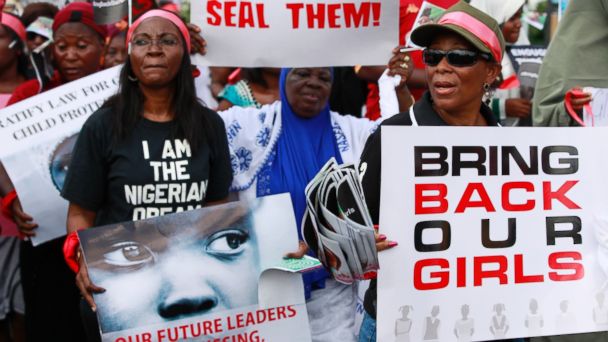U.S. Sends Drone, 80 Troops to Chad for Missing Schoolgirls Search

(Sunday Alamba/AP Photo)
The United States is sending 80 military personnel and one unarmed Predator reconnaissance aircraft to Chad as part of a growing effort to find the more than 275 Nigerian schoolgirls kidnapped by Islamic extremists a month ago. The unmanned reconnaissance aircraft will join similar aircraft based in Niger that have been participating in the search for the last week.
The deployment to Chad was revealed in a War Powers Act notification letter sent Wednesday to Speaker of the House John Boehner by President Obama.
According to the letter, "approximately 80 U.S. Armed Forces personnel have deployed to Chad as part of the U.S. efforts to locate and support the safe return of over 200 schoolgirls who are reported to have been kidnapped in Nigeria. "
The letter added, "These personnel will support the operation of intelligence, surveillance, and reconnaissance aircraft for missions over northern Nigeria and the surrounding area. The force will remain in Chad until its support in resolving the kidnapping situation is no longer required."
U.S. officials tell ABC News that an unarmed Predator aircraft will be sent to Chad along with 80 military personnel. Those military personnel are mostly Air Force airmen who will fly and maintain the Predators and also provide ground security.
Sending the Predators to Chad puts them closer to the search area in northeastern Nigeria and allows for a longer loiter time over Boko Haram's stronghold.
The Predators will join the existing surveillance flights of both manned and unmanned aircraft that have been flown out of neighboring Niger.
U.S. military service members form part of an interagency team working out of the U.S. embassy in Abuja that is helping to coordinate the search with Nigerian authorities. Pentagon officials have said that there are no plans for U.S. military personnel to conduct ground operations in the search for the missing girls.
Last week the U.S. began flying manned surveillance flights by a MC-12 Liberty military surveillance aircraft based in Niger. A few days later an unmanned Global Hawk aircraft based in Sigonella, Sicily, also joined the effort and has now been repositioned to Niger.
For the last year the United States has based several Predator aircraft in Niger to assist the French military effort in Mali against Islamic extremists. Officials say that some of these Predator aircraft have also flown search missions over Nigeria.
The United States has been sharing limited information from these flights with Nigeria because a formal intelligence sharing agreement does not exist between the two countries.
At a hearing on Boko Haram today, House Foreign Affairs Chairman Ed Joyce suggested that the administration treat the hunt for the girls and the help with fighting Boko Haram similar to what the U.S. is doing in looking for LRA warlord Joseph Kony. About 300 troops are currently spread out between northern Uganda, the Congo, South Sudan and Central African Republic, advising the respective militaries and helping provide intelligence and reconnaissance information.
Chad has a strong history with working with Western militaries, particularly the French and the U.S. in Mali in the fight against Al Qaeda last year. Nigeria by contrast has had a challenging relationship with its Western counterparts, something Under Secretary of State Sarah Sewall acknowledged in congressional testimony Wednesday.
Sewall just returned from a visit to Nigeria last week with U.S. Africa Command's Gen. David Rodriguez where she said they had a "frank" discussion with Nigerian military officials about their need to reform and about providing security in the North where Boko Haram operates, adding that she and the general expressed their concerns about how Nigeria's endemic corruption has led to "the inability of a seemingly very large defense budget to translate into the receipt of bullets and workable trucks at the level of the Seventh Division in the northeast."
Sewall said that nearly 50 percent of the Nigerian military is eligible for U.S. military help and training because of committing human rights abuses, which disqualifies them under the Leahy law. Both State Department and Pentagon officials have said that so far the Leahy Law is not playing a role in limiting U.S. assistance in the search.